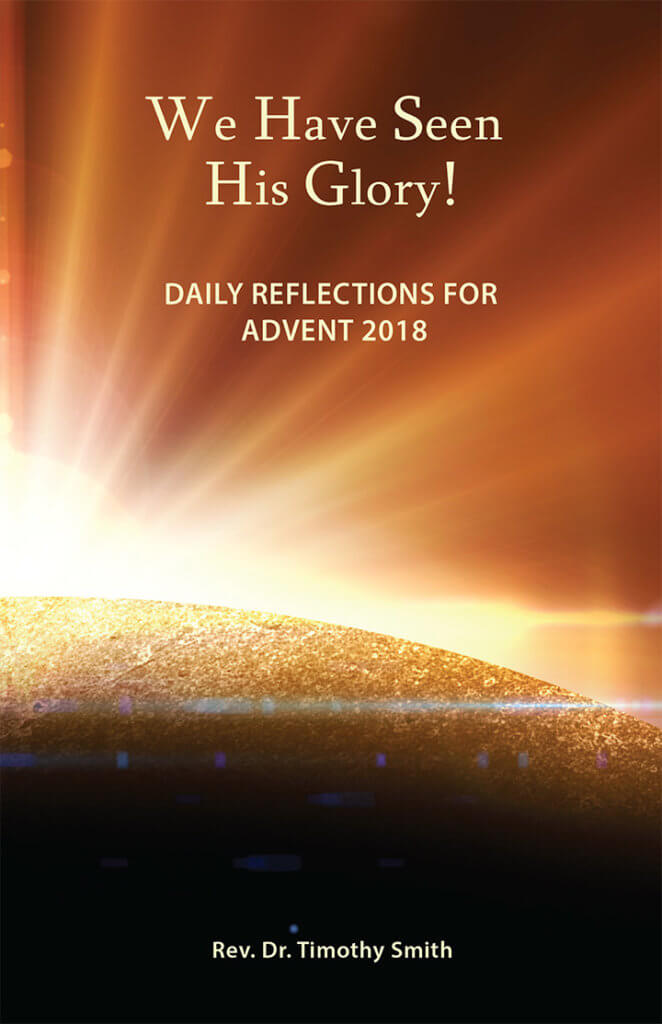PRAY
“Speak Lord, for your servant is listening” (1 Samuel 3:10).
READ
From his fullness we have all received, grace upon grace.
The law indeed was given through Moses; grace and truth came
through Jesus Christ. No one has ever seen God. It is God the only Son,
who is close to the Father’s heart, who has made him known.
John 1:16-18
It was a lot of Christmases ago but I still think of the day. I was home from college where I was beginning to study Classical Greek, even reading lines from Plato and Homer. My parents knew I was eager to try out my Greek on the New Testament, so put a Greek New Testament under our Christmas tree. I excitedly opened my gift and turned to the Greek text. Having heard the Gospel of John was written in the simplest Greek in the New Testament, I turned to John’s first lines.
I quickly saw that John wrote in the plain, everyday language of fishermen, merchants, farmers and tax collectors. John obviously had good news he wanted everyone to hear. The first line of John’s Gospel was easy: “Ev arch en ho Logos kai ho Logos en pros ton Theon kai Theos en o Logos.” I got what John was saying: “In the beginning was the Word, and the Word was with God, and the Word was God.” I read on, stumbling over some words, but plowed through to verse 12: “But to all who received him, who believed in his name, he gave power to become children of God.”
I had memorized that verse as a boy, but that Christmas Day read it with new eyes. It all had to do with seeing the Greek preposition eis, “into”. I had not expected it. John wrote about those believing eis, “into” Jesus’ name. The Gospel isn’t just inviting people to believe “in” Jesus, but to actually believe “into” Jesus. We get to share His life! With that preposition eis, John is saying Christian faith is more than just intellectual belief. Rather, as New Testament scholar Bruce Milne observes, the preposition eis “reflects John’s concern for the dynamic nature of faith.” (Bruce Milne, The Message of John) Eis emphasizes the kind of active believing “into” that once moved a young fisherman named John to drop his nets and follow Jesus (Mark 1:18-20).
I realized that believing “into” Jesus is more than believing right theology and doctrine: believing “into” Jesus means union and communion with Him. We discover that He is the Vine and we are the branches (John 15:5); He is in us and we are in Him (John 14:20). Jesus became flesh and lived “into” us that we might live “into” Him (Galatians 2:20). This is the glory of Christmas!
Through the days of Advent and Christmas we have pondered the glory of God revealed in the Word who became flesh. We have seen the glory of God the Father as a glory full of grace and truth. Athanasius, the early church theologian, rejoiced in the Word who became flesh: “He became what we are that we might become what He is.” (Athanasius, The Incarnation of the Word) The church father Irenaeus celebrated “the Word of God, our Lord Jesus Christ, who did, through transcendent love become what we are in order to make us what he is himself.” (Irenaeus, Against Heresies, Book V) C. S. Lewis took up the wondrous theme of early Christians, declaring: “The Son of God became man to enable men to become sons of God.” (C. S. Lewis, Mere Christianity)
This is the glory of God, the radiant expression of His other-centered, self-giving love. We pray this Christmas day that the Holy Spirit, who makes our bodies His temple, will reveal to us yet more of the Father’s glory! He loves us far beyond our comprehension and longs for us to love Him in return! We have seen His glory! We have seen Jesus!
PONDER
- What would it mean for me to believe “into” Jesus?
- What would it mean for me to share life with Jesus in 2019?
PALMS DOWN/PALMS UP
For a moment hold your PALMS DOWN in a symbolic gesture of letting go to God your worries for the day, the busyness of the season, and expectations of the way the holidays ought to be. Release all of these concerns to God.
Next, hold your PALMS UP as a symbolic gesture of receiving God’s gifts, provision, and guidance for today.
“Christ by highest heav’n adored,
Christ the everlasting Lord!
Late in time behold Him come,
Offering of a Virgin’s womb.
Veiled in flesh the Godhead see;
Hail the Incarnate Deity,
Pleased as man with man to dwell,
Jesus, our Emmanuel.
Hark! The herald angels sing
‘Glory to the newborn King!'”
Charles Wesley,
“Hark! The Herald Angels Sing”
We Have Seen His Glory!



